Module2 Highlights of My Senior Year综合检测(外研版选修7)
高考英语 Module2 Highlights of My

闪堕市安歇阳光实验学校英语复习模块能力检测:Module2 Highlights of My Senior Year(外研版选修7)Ⅰ. 单词拼写1. They moved the local people and settled (安顿)them in another place.2. This hot weather doesn’t suit(适合)me.3. The attraction (引力)of the moon for the earth causes the tides.4. It is considerate(体贴入微的)of you to help me when I am in trouble.5. I’m always upset (心烦意乱的)when I don’t pass the exams.6. By tradition (传统),people play tricks on 1st, April.7. She is always punctual (准时的),but her deskmate is always late.8. I’m proud that my son wins a scholarship (奖学金)every term at college.9. He brought a lot of luggage (行李)when he came here.10. Tom stayed in China for a fortnight (两周).Ⅱ. 完成句子1. 我把汤姆当成我最好的朋友。
I consider Tom as/to be my best friend.2. 他们让我走,换句话说,我被解雇了。
They’re letting me go—in other words , I’ve been fired.3. 我的英语老师可能马上来这里。
My English teacher is likely to come here soon. 4. 就我而言,爬泰山是我们旅程中的亮点。
高考英语 Module 2 Highlights of My Senior

闪堕市安歇阳光实验学校Module 2 Highlights of My Senior YearⅠ.单项填空1.—Putting on a happy face not only helps us make friends but also makes us feel better.—________.A.It’s up to you.B.Thank goodness!C.Let’s get going. D.I’m with you on that.答案 D [考查交际用语。
第一句话表明一个观点,答语应对这个观点表示赞同或者否定,故选D(我在那点上赞同你的观点。
) It’s up to you.由你决定。
Thank goodness!谢天谢地!Let’s get going.我们开始吧。
]2.I can’t say a thankyou________much.I couldn’t have succeeded without your help.A.too B.quiteC.that D.very答案 A [考查副词用法。
句意表示“我再怎么感谢你也不过分”,故选A。
can’t...too...再……也不过分。
]3.Our football team will compete against the Japanese team this evening.Let’s go and_____them_____,shall we?A.cheer;up B.join;inC.add;up D.pick;up 答案 A [句意为“今晚我们的足球队要和队比赛,让我们去给他们加油好吗?”cheer sb.up表示“为某人加油”。
]4.You are sure to know the result,but that’s________everybody has finished their work.A.when B.whyC.before D.until答案 A [考查名词性从句。
Module 2 Highlights of My Senior Year
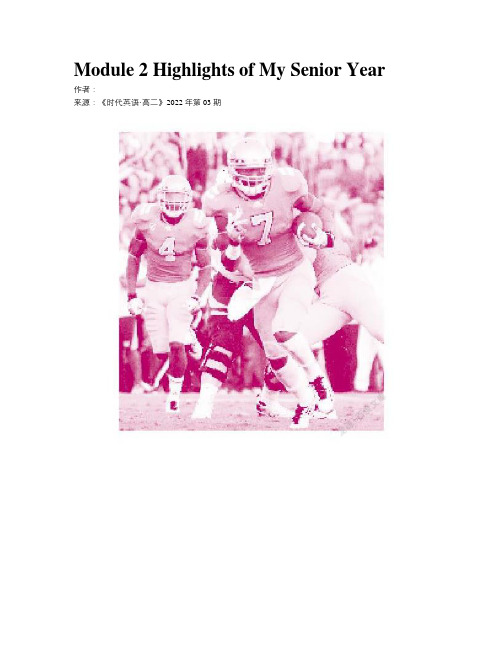
Module 2 Highlights of My Senior Year 作者:来源:《时代英语·高二》2022年第03期跟蹤导练(一)阅读理解NMET may be a new word to most. But if we put it “College Entrance Examination”, it will be familiar to most of us, who have had bone-biting experience and sweet memory of having had it and enjoying a relatively successful and full life.NMET is the most important way of choosing wise heads both in history and at present. Maybe it is because it’s harder to invent a new way that NMET wil l still be playing an important part in theeducation in China. No matter how well you are doing and how good you are at your schooling, the last 3 or 4 days,the 7 sets of paper work and your final scores will give you the “final sentence”.Those lucky students would be enjoying the fruitful rewards while the failed ones would have to take in bitter and tearful results as if they had done nothing during the previous years. It is the same with their parents. Even worse, our society is now in the habit of making favorable judgment over those lucky ones without showing enough care to the failed ones. In this way those who failed are under pressure beyond their ability to bear, which will naturally lead to some tragedies after the public announcement of the NMET results.I can’t predict anything but I really wish all the NMET takers could get a satisfactory result. I call on more care from parents and the society about those who need our care. Though we have no way to have the system changed, we can still do something to change what we can change.When one door closes, another window opens. So long as you are on the track and spare no effort, there should be a bright future not far ahead of you.1. What does the underlined word “bo ne-biting” in Paragraph 1 probably mean?A. Unfortunate.B. Unforgettable.C. Happy.D. Brave.2. What will decide your fate according to Paragraph 2?A. Your good schooling.B. The final scores of NMET.C. Hard working.D. Being well-educated.3. What makes matters worse for the failed students according to Paragraph 3?A. Lack of care.B. Pressure from parents.C. Worries about the future.D. Favorable judgment over the lucky ones.4. To whom does the author write the text?A. Parents.B. Teachers.C. Officials.D. Students.阅读七选五How to Plan out Your Week in AdvanceHaving a weekly routine is important. It allows you to know exactly the direction in which you’ re heading and what you need to do in a week. So, how do you plan out your week?Figure out the big things.Take some time each Sunday to think about what has to happen the following week. Most weeks will have the same basic building blocks—the “big things” that never change. 1 But for me they include putting in a full workday, ensuring each child practices their instrument, getting at least 8 hours of sleep, cooking a good meal each night, and working out 4—5 times.Think about the small things.2 Medical appointments, coffee dates with friends,children’s birthday parties or play dates. I have rules for these sorts of events: they must be scheduled for evenings or weekends.3 Otherwise, they may affect the quality of my work.Set your goals.If there are specific things you need or would like to accomplish in a given week, list them and plan for them. 4 Executive (行政的) coach Rafael Sarandeses recommends setting five weekly goals and three daily ones. That’s a generous number that’s sure to keep your momentum (動力)going.5I’m a firm believer in morning hours setting the tone for the rest of the day. I think it’s important to get up at the same time every day. It doesn’t have to be early, but it should be consistent.A. Have a morning routine.B. Everyone’s big things will look different.C. Planning is a habit that must be developed.D. I try not to let them occupy my work hours.E. Give it a try and see what a difference it makes.F. These could be personal goals or professional goals.G. Next come the small things that change week by week.1. 2. 3. 4. 5.跟踪导练(二)完形填空History rocks! But your poor history teacher was not able to 1 all the fun little bits. Whether these bits were sad, ridiculous, or heartwarming,we think it’s a shame that you 2 out the bits. And now we help you make up for that.Famous for his beard, Abraham Lincoln was an incredibl e 3 . Though he wasn’t actually born in a very poor family, he did have a relatively 4 childhood. Hard labor was part of the daily life in the area where Lincoln grew up, and, at the age of nine, he 5 his mother because of disease. As president, he would g row to be history’s 6 president of the United States, standing proudly at 1.93 meters. Even after he died,his story didn’t 7 . In 1876, a group of bad fellows wanted to hold Lincoln’s body for ransom (赎金) at the fee of $20,000 and the 8 of one of their accomplices (同谋犯). They were caught and 9 to a year in prison.Figure out the big things.Take some time each Sunday to think about what has to happen the following week. Most weeks will have the same basic building blocks—the “big things” th at never change. 1 But for me they include putting in a full workday, ensuring each child practices their instrument, getting at least 8 hours of sleep, cooking a good meal each night, and working out 4—5 times.Think about the small things.2 Medical appointments, coffee dates with friends,children’s birthday parties or play dates. I have rules for these sorts of events: they must be scheduled for evenings or weekends.3 Otherwise, they may affect the quality of my work.Set your goals.If there are specific things you need or would like to accomplish in a given week, list them and plan for them. 4 Executive (行政的) coach Rafael Sarandeses recommends setting five weekly goals and three daily ones. That’s a generous number that’s sure to keep your momentum (动力)going.5I’m a firm believer in morning hours setting the tone for the rest of the day. I think it’s important to get up at the same time every day. It doesn’t have to be early, but it should be consistent.A. Have a morning routine.B. Everyone’s big things will look different.C. Planning is a habit that must be developed.D. I try not to let them occupy my work hours.E. Give it a try and see what a difference it makes.F. These could be personal goals or professional goals.G. Next come the small things that change week by week.1. 2. 3. 4. 5.跟踪导练(二)完形填空History rocks! But your poor history teacher was not able to 1 all the fun little bits. Whether these bits were sad, ridiculous, or heartwarming,we think it’s a shame that you 2 out the bits. And now we help you make up for that.Famous for his beard,Abraham Lincoln was an incredible 3 . Though he wasn’t actually born in a very poor family, he did have a relatively 4 childhood. Hard labor was part of the daily life in the area where Lincoln grew up, and, at the age of nine, he 5 his mother because of disease. As president,he would grow to be history’s 6 president of the United States, standing proudly at 1.93 meters. Even after he died,his story didn’t 7 . In 1876, a group of bad fellows wanted to hold Lincoln’s body for ransom (赎金) at the fee of $20,000 and the 8 of one of their accomplices (同謀犯). They were caught and 9 to a year in prison.Figure out the big things.Take some time each Sunday to think about what has to happen the following week. Most weeks will have the same basic building blocks—the “big things” that never change. 1 Bu t for me they include putting in a full workday, ensuring each child practices their instrument, getting at least 8 hours of sleep, cooking a good meal each night, and working out 4—5 times.Think about the small things.2 Medical appointments, coffee dates with friends,children’s birthday parties or play dates. I have rules for these sorts of events: they must be scheduled for evenings or weekends.3 Otherwise, they may affect the quality of my work.Set your goals.If there are specific things you need or would like to accomplish in a given week, list them and plan for them. 4 Executive (行政的) coach Rafael Sarandeses recommends setting five weekly goals and three daily ones. That’s a generous number that’s sure to keep your momentum (動力)going.5I’m a firm believer in morning hours setting the tone for the rest of the day. I think it’s important to get up at the same time every day. It doesn’t have to be early, but it should be consistent.A. Have a morning routine.B. Everyone’s big things will look different.C. Planning is a habit that must be developed.D. I try not to let them occupy my work hours.E. Give it a try and see what a difference it makes.F. These could be personal goals or professional goals.G. Next come the small things that change week by week.1. 2. 3. 4. 5.跟踪导练(二)完形填空History rocks! But your poor history teacher was not able to 1 all the fun little bits. Whether these bits were sad, ridiculous, or heartwarming,we think it’s a shame that you 2 out the bits. And now we help you make up for that.Famous for his beard,Abraham Lincoln was an incredible 3 . Though he wasn’t actually born in a very poor family, he did have a relatively 4 childhood. Hard labor was part of the daily life in the area where Lincoln grew up, and, at the age of nine, he 5 his mother because of disease. As president,he would grow to be history’s 6 president of the Uni ted States, standing proudly at 1.93 meters. Even after he died,his story didn’t 7 . In 1876, a group of bad fellows wanted to holdLincoln’s body for ransom (赎金) at the fee of $20,000 and the 8 of one of their accomplices (同谋犯). They were caught and 9 to a year in prison.Figure out the big things.Take some time each Sunday to think about what has to happen the following week. Most weeks will have the same basic building blocks—the “big things” that never change. 1 But for me they include putting in a full workday, ensuring each child practices their instrument, getting at least 8 hours of sleep, cooking a good meal each night, and working out 4—5 times.Think about the small things.2 Medical appointments, coffee dates with friends,children’s birthday parties or play dates. I have rules for these sorts of events: they must be scheduled for evenings or weekends.3 Otherwise, they may affect the quality of my work.Set your goals.If there are specific things you need or would like to accomplish in a given week, list them and plan for them. 4 Executive (行政的) coach Rafael Sarandeses recommends setting five weekly goals and three daily ones. That’s a generous number that’s sure to keep your momentum (动力)going.5I’m a firm believer in morning hours setting the tone for the rest of the day. I think it’s important to get up at the same time every day. It doesn’t have to be early, but it should be consistent.A. Have a morning routine.B. Everyone’s big things will look different.C. Planning is a habit that must be developed.D. I try not to let them occupy my work hours.E. Give it a try and see what a difference it makes.F. These could be personal goals or professional goals.G. Next come the small things that change week by week.1. 2. 3. 4. 5.跟蹤导练(二)完形填空History rocks! But your poor history teacher was not able to 1 all the fun little bits. Whether these bits were sad, ridiculous, or heartwarming,we think it’s a shame that you 2 out the bits. And now we help you make up for that.Famous for his beard,Abraham Lincoln was an incredible 3 . Though he wasn’t actually born in a very poor family, he did have a relatively 4 childhood. Hard labor was part of the daily life in the area where Lincoln grew up, and, at the age of nine, he 5 his mother because of disease. As president,he would grow to be history’s 6 president of the United States, standing proudly at 1.93 meters. Even after he died,his story didn’t 7 . In 1876, a group of bad fellows wanted to hold Lincoln’s body for ransom (赎金) at the fee of $20,000 and the 8 of one of their accomplices (同谋犯). They were caught and 9 to a year in prison.Figure out the big things.Take some time each Sunday to think about what has to happen the following week. Most weeks will have the same basic building blocks—the “big things” that never change. 1 But for me they include putting in a full workday, ensuring each child practices their instrument, getting at least 8 hours of sleep, cooking a good meal each night, and working out 4—5 times.Think about the small things.2 Medical appointments, coffee dates with friends, chil dren’s birthday parties or play dates. I have rules for these sorts of events: they must be scheduled for evenings or weekends.3 Otherwise, they may affect the quality of my work.Set your goals.If there are specific things you need or would like to accomplish in a given week, list them and plan for them. 4 Executive (行政的) coach Rafael Sarandeses recommends setting five weekly goals and three daily ones. That’s a generous number that’s sure to keep your momentum (动力)going.5I’m a firm believer in morning hours setting the tone for the rest of the day. I think it’s important to get up at the same time every day. It doesn’t have to be early, but it should be consistent.A. Have a morning routine.B. Everyon e’s big things will look different.C. Planning is a habit that must be developed.D. I try not to let them occupy my work hours.E. Give it a try and see what a difference it makes.F. These could be personal goals or professional goals.G. Next come the small things that change week by week.1. 2. 3. 4. 5.跟踪导练(二)完形填空History rocks! But your poor history teacher was not able to 1 all the fun little bits. Whether these bits were sad, ridiculous, or heartwarming,we think it’s a shame that you 2 out the bits. And now we help you make up for that.Famous for his beard,Abraham Lincoln was an incredible 3 . Though he wasn’t actually born in a very poor family, he did have a relatively 4 childhood. Hard labor was part of the daily life in the area where Lincoln grew up, and, at the age of nine, he 5 his mother because of disease. As president,he would grow to be history’s 6 president of the United States, standing proudly at 1.93 meters. Even after he died,his story didn’t 7 . In 1876, a group of bad fellows wanted to hold Lincoln’s body for ransom (贖金) at the fee of $20,000 and the 8 of one of their accomplices (同谋犯). They were caught and 9 to a year in prison.Figure out the big things.Take some time each Sunday to think about what has to happen the following week. Most weeks will have the same basic building blocks—the “big things” that never change. 1 But for me they include putting in a full workday, ensuring each child practices their instrument, getting at least 8 hours of sleep, cooking a good meal each night, and working out 4—5 times.Think about the small things.2 Medical appointments, coffee dates with friends,children’s birthday parties or play dates. I have rules for these sorts of events: they must be scheduled for evenings or weekends.3 Otherwise, they may affect the quality of my work.Set your goals.If there are specific things you need or would like to accomplish in a given week, list them and plan for them. 4 Executive (行政的) coach Rafael Sarandeses recommends setting five weekly goals and three daily ones. That’s a generous number that’s sure to keep your momentum (动力)going.5I’m a firm believer in morning hours setting the tone for the rest of the day. I think it’s important to get up at the same time every day. It doesn’t have to be early, but it should be consistent.A. Have a morning routine.B. Everyone’s big things w ill look different.C. Planning is a habit that must be developed.D. I try not to let them occupy my work hours.E. Give it a try and see what a difference it makes.F. These could be personal goals or professional goals.G. Next come the small things that change week by week.1. 2. 3. 4. 5.跟踪导练(二)完形填空History rocks! But your poor history teacher was not able to 1 all the fun little bits. Whether these bits were sad, ridiculous, or heartwarming,we think it’s a shame that you 2 out the bits. And now we help you make up for that.Famous for his beard,Abraham Lincoln was an incredible 3 . Though he wasn’t actually born in a very poor family, he did have a relatively 4 childhood. Hard labor was part of the daily life inthe area where Lincoln grew up, and, at the age of nine, he 5 his mother because of disease. As president,he would grow to be history’s 6 president of the United States, standing proudly at 1.93 meters. Even after he died,his story didn’t 7 . In 1876, a group of bad fellows wanted to hold Lincoln’s body for ransom (贖金) at the fee of $20,000 and the 8 of one of their accomplices (同谋犯). They were caught and 9 to a year in prison.Figure out the big things.Take some time each Sunday to think about what has to happen the following week. Most weeks will have the same basic building blocks—the “big things” that never change. 1 But for me they include putting in a full workday, ensuring each child practices their instrument, getting at least 8 hours of sleep, cooking a good meal each night, and working out 4—5 times.Think about the small things.2 Medical appointments, coffee dates with friends,children’s birthday parties or pla y dates. I have rules for these sorts of events: they must be scheduled for evenings or weekends.3 Otherwise, they may affect the quality of my work.Set your goals.If there are specific things you need or would like to accomplish in a given week, list them and plan for them. 4 Executive (行政的) coach Rafael Sarandeses recommends setting five weekly goals and three daily ones. That’s a generous number that’s sure to keep your momentum (動力)going.5I’m a firm believer in morning hours setting the tone for the rest of the day. I think it’s important to get up at the same time every day. It doesn’t have to be early, but it should be consistent.A. Have a morning routine.B. Everyone’s big things will look diffe rent.C. Planning is a habit that must be developed.D. I try not to let them occupy my work hours.E. Give it a try and see what a difference it makes.F. These could be personal goals or professional goals.G. Next come the small things that change week by week.1. 2. 3. 4. 5.跟踪导练(二)完形填空History rocks! But your poor history teacher was not able to 1 all the fun little bits. Whether these bits were sad, ridiculous, or heartwarming,we think it’s a shame that you 2 out the bits. And now we help you make up for that.Famous for his beard,Abraham Lincoln was an incredible 3 . Though he wasn’t actually born in a very poor family, he did have a relatively 4 childhood. Hard labor was part of the daily life in the area where Lincoln grew up, and, at the age of nine, he 5 his mother because of disease. As president,he would grow to be history’s 6 president of the United States, standing proudly at 1.93 meters. Even after he died, hi s story didn’t 7 . In 1876, a group of bad fellows wanted to hold Lincoln’s body for ransom (赎金) at the fee of $20,000 and the 8 of one of their accomplices (同谋犯). They were caught and 9 to a year in prison.。
Module 2 Highlights of My Senior Year
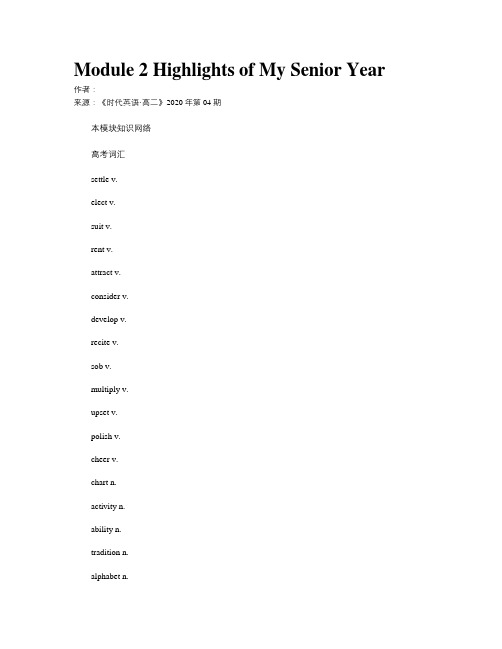
Module 2 Highlights of My Senior Year 作者:来源:《时代英语·高二》2020年第04期本模块知识网络高考词汇settle v.elect v.suit v.rent v.attract v.consider v.develop v.recite v.sob v.multiply v.upset v.polish v.cheer v.chart n.activity n.ability n.tradition n.alphabet n.suitcase n.luggage n.pillow n.quilt n.armchair n. cushion n.kettle n.decoration n. curtain n.washroom n. basin n.bathtub n.arithmetic n. algebra n.geometry n. concept n.acre n.gram n.bachelor n. microscope n. regulation n. T-shirt n.Catholic n.zipper n.button n.mailbox n.mummy n.airmail n.fortnight n.certificate n.scholarship n. routine n.course n.competitive adj. outdoor adj.innocent adj.worn adj.shabby adj.cubic adj.dynamic adj.botanical adj. punctual adj.forever adv.常用短語have funIt’s a great pity that...as far as I’m concernedin my viewbe considered asbe likely to do词汇短语园地1. settle v. 解决(分歧、纠纷等),结束(争论、争端等);(最终)决定,确定,安排好;定居It’s time that you settled your differences with your father.现在你该解决同你父亲之间的分歧了。
Module 2 Highlights of My Senior Year

9.ability n.能力;本领;技能→ disability
10.tradition n.传统→ traditional adj.传统的
返回
11.innocent adj.天真无邪的;阅世不深的→ innocence n.清 白;天真无邪 12.worn adj.(物品)陈旧的,损坏的→ wear v.穿;戴
16. photography n.
Ⅲ.拓展单词——通其变
1.settle v.解决;定居→ settlement 定居点→ settler n.移民;殖民者
返回
n.和解;协议;安顿;
2.competitive adj.好强的;好竞争的→ compete v.竞争;竞赛 → competition n.竞争;竞赛;比赛→ competitor n.竞争 者;对手 3.elect v.选举;推选→ election n.选举→ elector n.选举人 4.suit v.合适;适合→ suitable adj.合适的;适当的 [纵联 5]
13.decoration n.装饰物→ decorate vt.装饰→ decorative adj. 装饰的 14.regulation n.规章,规则,条例→ regular adj.有规律的; 经常的 15.cheer v.欢呼;喝彩;加油→cheerful adj.快乐的;愉快的
返回
NO.2 纵联同主族词汇
——一线串珠——
返回
纵联 1.“时间”都去哪儿了? ①fortnight n.两星期 ③decade n.十年
纵联 2.“哭泣”表情包 ①sob v.呜咽,啜泣 ③weep v.哭泣;流泪 ⑤burst into tears 突然哭起来
纵联 3.数学运算常用到 ①multiply v.乘,使相乘 ②divide v.除;除以
高中英语Module2HighlightsofMySeniorYear单元整合提升课后作业外
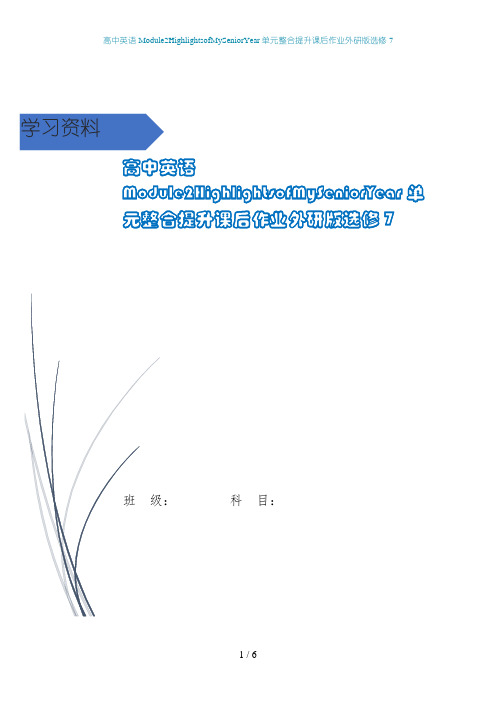
Module 2 Highlights of My Senior Year单元整合提升Ⅰ.单词拼写1. The teacher asked each child to recite (背诵) a poem to the class。
2. He works as a consultant in a financial institution (机构).3。
The new manager seems a dynamic (精力充沛的) leader.4。
Under the new regulations (条例) spending on office equipment will be strictly controlled.5. He would like his guests to be punctual (准时的).6。
Ann will be given a certificate (合格证书) at the end of the program to show she has learned computer skills。
7。
He’s been in formed that he doesn't qualify for the scholarship (奖学金) because of his academic background.8。
Shirley wants to take a course (课程) in art and design next term.9. You’d better set a good example to your younger sister because she is so innocent (天真无邪的) as to believe everything you say.10.During the reconstruction of the city, many modern tall buildings went up where old shabby (破旧的) houses were torn down。
高中英语 Module 2 Highlights of My Senior Year单元综合测试卷 外研版选修7
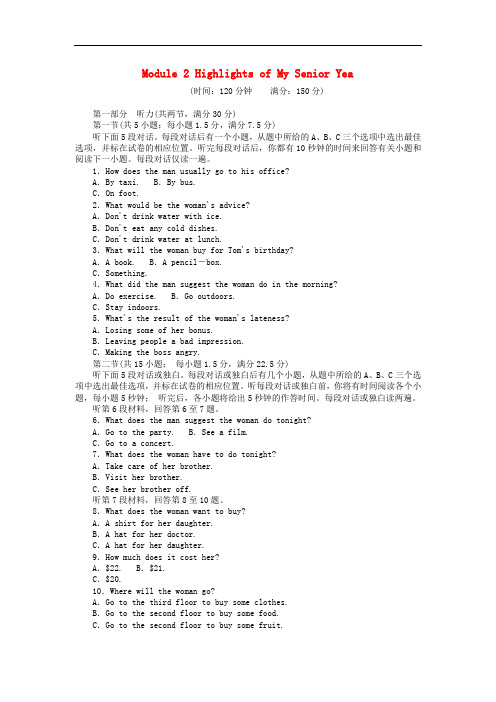
Module 2 Highlights of My Senior Yea(时间:120分钟满分:150分)第一部分听力(共两节,满分30分)第一节(共5小题;每小题1.5分,满分7.5分)听下面5段对话。
每段对话后有一个小题,从题中所给的A、B、C三个选项中选出最佳选项,并标在试卷的相应位置。
听完每段对话后,你都有10秒钟的时间来回答有关小题和阅读下一小题。
每段对话仅读一遍。
1.How does the man usually go to his office?A.By taxi. B.By bus.C.On foot.2.What would be the woman's advice?A.Don't drink water with ice.B.Don't eat any cold dishes.C.Don't drink water at lunch.3.What will the woman buy for Tom's birthday?A.A book. B.A pencil-box.C.Something.4.What did the man suggest the woman do in the morning?A.Do exercise. B.Go outdoors.C.Stay indoors.5.What's the result of the woman's lateness?A.Losing some of her bonus.B.Leaving people a bad impression.C.Making the boss angry.第二节(共15小题;每小题1.5分,满分22.5分)听下面5段对话或独白。
每段对话或独白后有几个小题,从题中所给的A、B、C三个选项中选出最佳选项,并标在试卷的相应位置。
听每段对话或独白前,你将有时间阅读各个小题,每小题5秒钟;听完后,各小题将给出5秒钟的作答时间。
外研版高中英语选修7 Module 2《Highlight of My Senior Year》综合
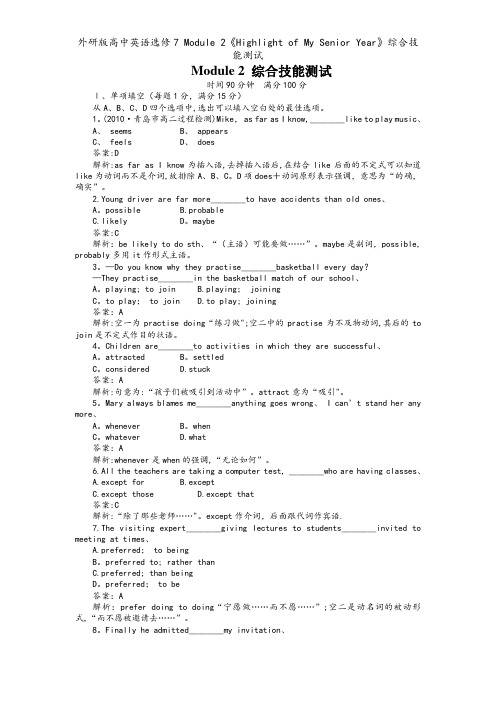
Module 2 综合技能测试时间90分钟满分100分Ⅰ、单项填空(每题1分,满分15分)从A、B、C、D四个选项中,选出可以填入空白处的最佳选项。
1。
(2010·青岛市高二过程检测)Mike, as far as I know,________like to play music、A、 seemsB、 appearsC、 feelsD、 does答案:D解析:as far as I know为插入语,去掉插入语后,在结合like后面的不定式可以知道like为动词而不是介词,故排除A、B、C。
D项does+动词原形表示强调,意思为“的确,确实”。
2.Young driver are far more________to have accidents than old ones、A。
possible B.probableC.likely D。
maybe答案:C解析:be likely to do sth、“(主语)可能要做……”。
maybe是副词,possible, probably多用it作形式主语。
3。
—Do you know why they practise________basketball every day?—They practise________in the basketball match of our school、A。
playing; to join B.playing; joiningC。
to play; to join D.to play; joining答案:A解析:空一为practise doing“练习做";空二中的practise为不及物动词,其后的to join是不定式作目的状语。
4。
Children are________to activities in which they are successful、A。
attracted B。
settledC。
- 1、下载文档前请自行甄别文档内容的完整性,平台不提供额外的编辑、内容补充、找答案等附加服务。
- 2、"仅部分预览"的文档,不可在线预览部分如存在完整性等问题,可反馈申请退款(可完整预览的文档不适用该条件!)。
- 3、如文档侵犯您的权益,请联系客服反馈,我们会尽快为您处理(人工客服工作时间:9:00-18:30)。
Module 2 Highlights of My Senior Year综合检测答案时间100分钟满分120分答案:D推理判断题。
根据第一段中对the summer learning gap的解释可知,它表示学生在家时间越长,他们忘的知识越多。
由此可知,这样会影响学生的正常学习。
答案:A细节理解题。
根据第四段的Across the country, research shows that students from poor families fall farther behind over the summer than other students.可知A项正确。
根据第三段的内容可知B项错误;根据第二段的They were spread among forty-six of the fifty states.可知C项错误;根据第四段的Experts say this can be prevented.可知D项错误。
答案:A推理判断题。
根据最后一段可知,父母不喜欢“summer school”一词的原因,是因为他们认为暑假应给孩子自由和快乐。
答案:D主旨大意题。
本文主要针对the summer learning gap这一现象提到了美国的教育。
答案:D综合判断题。
文章第一段出现have difficulty reading,第二段出现elementary school students,把两处信息综合起来,可得出答案。
match sounds with letters是本文介绍的训练手段,而不能断定小学生不能这样做,故不选B、C项,通过后文看,阅读能力差的学生不仅仅是左脑结构不活跃,而且是整个大脑结构不活跃。
答案:C细节理解题。
文章倒数第二段有两处信息说明:The pictures showed an increase in activity in the back of the brain on the left side. This activated brain area appears to include a structure(结构)that helps people recognize familiar written words quickly. In lower level readers, this structure remains inactive.由此断定,这项训练目的在于激活学生左脑不活跃的脑组织。
答案:B推理判断题。
文章介绍的这种训练是出声朗读,因此最后表示怀疑的人显然认为学生该“默读”,不必去进行“音”和“形”的对应。
答案:A词义理解题。
通过文章提供的语境判断,这是一项“训练”学生阅读能力的项目。
CAmerican children aren't the only couch potatoes with nearly one third of children globally spending three hours a day or more watching TV or on computers, according to a study of over 70,000 teens in 34 nations. Regina Gutbold of the World Health Organization in Geneva and her colleagues found most children aren't getting enough exercise and it made no difference if they lived in a rich or a poor country. The study looked at 72,845 schoolchildren aged 13 to 15 from North and South America, Asia, Europe, and the Middle East. The children were surveyed between 2003 and 2013Children who spent three or more hours a day watching TV, playing computer games, orchatting with friends—aside from time in school or time spent doing homework—were classified as sedentary (惯于久坐的人). The researchers found only one quarter of the boys and 15 percent of the girls were getting enough exercise according to these definitions.Uruguay had the highest percentage of active boys, at 42 percent,while Zambia had the lowest, at 8 percent. Girls from India were the most active, with 37 percent meeting exercise recommendations (建议), while girls from Egypt were the least active, with just 4 percent getting enough exercise. Children in Myanmar were the least sedentary, with 13 percent of boys and 8 percent of girls classified as sedentary. The most sedentary nations were St. Lucia and the Cayman Islands,with 58 percent of boys and 64 percent of girls spending at least three hours a day in sedentary situationsWhile the study didn't look at the reasons behind the lack of physical activity in various nations,Gutbold said that urbanization (城市化) could be a factor as well as access to cars and TVs.9.The passage mainly tells us that ________.A.the WHO gave a report on children's healthB.the children in America are sedentaryC.nearly 1/3 of children globally lack enough exerciseD.different countries have different definitions of sedentary答案:C主旨大意题。
通读全文可知本文是有关青少年缺少运动的情况的调查报告。
列举了不同国家存在的青少年惯于久坐的普遍现象,所以选C。
10.The author lists a lot of numbers in the passage to ______.A.prove that the study results are reliableB.stress the importance of getting enough exerciseC.show rich countries are different from poor onesD.show the research lasted many years答案:A推理判断题。
本文首先点明“惯于久坐”现象在青少年中普遍。
为支持这种说法,作者列出了无论是富有还是贫穷国家都存在这种现明,以证明此报告真实可靠,所以选A。
11.This passage is most probably taken from ________.A.a geography textbookB.a newspaper reportC.a travel guideD.a pet magazine答案:B推理判断题。
根据本文内容是新闻报道,文章当然来自报社的报道。
A项意为“教科书”;C项意为“旅游指南”;D项意为“宠物杂志”,均与本文内容不符。
DAre you happy? Do you remember a time when you are happy? Are you seeking happiness today?Many have sought a variety of sources of happiness for their feeling of happiness. Some have put their hearts and efforts into their work. Too many turned to drugs and alcohol. Meanwhile untold numbers have looked for it in the possession of expensive cars, exotic vacation homes and other popular “toys”. Most of their efforts have a root in one common fact: people are looking for a lasting source of happiness.Unfortunately I believe that happiness escapes from many people because they misunderstand the journey of finding it. I have heard many people say that, “I will be happy when I get my new promotion,”or “I will be happy when I lose that extra 20 pounds. ”It is dangerous because it accepts that happiness is a“response” to having, being or doing something.In life, we all experience stimulus and response. Today some people think that an expensive car is a stimulus. Happiness is a response. A great paying job is stimulus. Happiness is a response. This belief leaves us thinking and feeling: “I will be happy when...”It has been my finding that actually the opposite is true. I believe that happiness is a stimulus and response is what life brings to those who are truly happy. When we are happy, we tend to have more success in our work. When we are happy,we more naturally take better care of our bodies and enjoy good health. Happiness is not a response but a stimulus.Happiness is a conscious choice we make in daily life. For unknown reasons to me, many choose to be upset and angry most of the time. Happiness is not something that happens to us after we get something that we want—we usually get things we want after we choose to be happy.12.From the second paragraph, we know too many people ________.A.are not happy when they work hard.B.are not happy when they drink or take drugs.C.all desire exotic vacation homes.D.are happy when they possess their own expensive cars.答案:D推理判断题。
